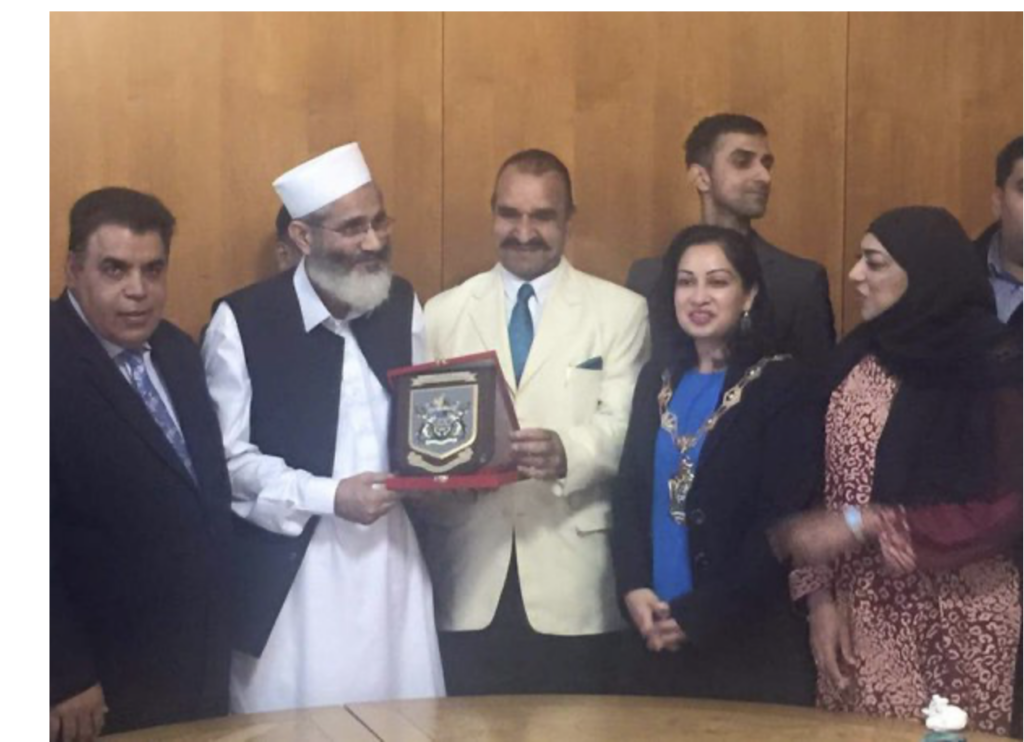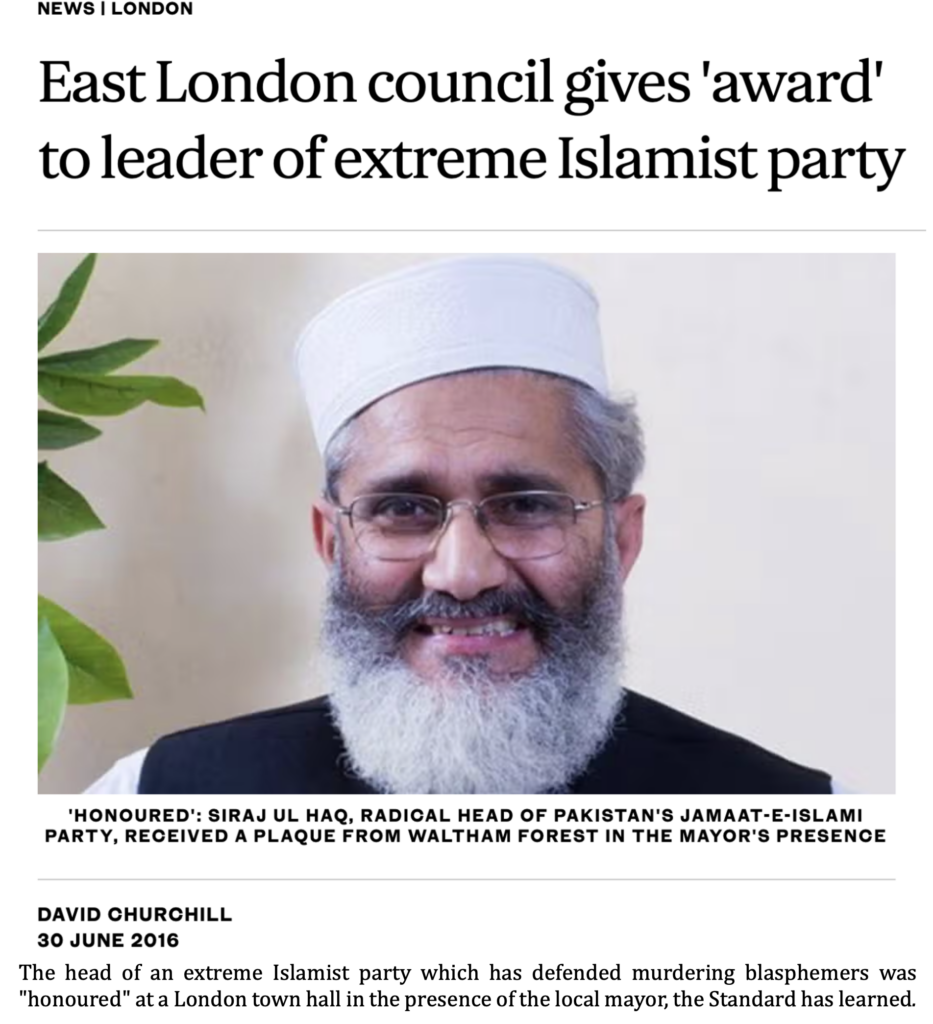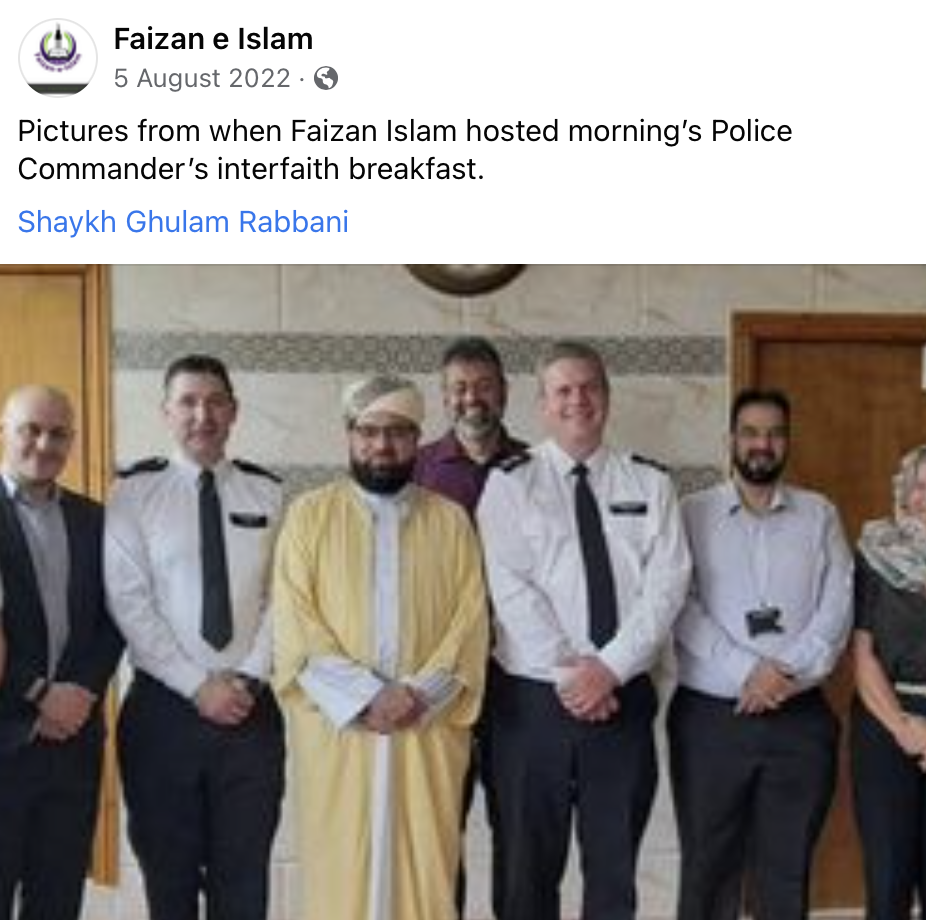Waltham Forest’s Great and Good – from Dr. Stella Creasy MP, to senior police officers, via LBWF Leader Grace Williams – come a cropper about faith-based zealotry…yet again
Over the years, senior members of the borough’s establishment on occasion have enthusiastically supported faith organisations – Christian and Muslim – which turn out to espouse unattractive values, values that no Town Hall officer or mainstream politician or police officer would express in public.
A classic example occurred in 2016, when a clutch of Labour councillors, (including the now Deputy Leader of Waltham Forest Council, Cllr. Ahsan Khan) attended an event in the Town Hall to celebrate the visiting Pakistani Senator Sirajul Haq, this happy gathering captured for posterity on Facebook:

It is unclear who knew what about Senator Haq, but it later took only ten minutes research by this blog to establish that he was a far-right demagogue, who previously had equated ‘blasphemy’ with terrorism; ranted about ‘Jews’ controlling the UN, and the ‘blasphemous acts and conspiracies of Christians and Jews’; and, in relation to proposed laws aimed at protecting women from violence, argued that they were evidence of the West’s ‘agenda to destroy the family system in Pakistan’.
The Evening Standard picked up the story, too, with a brutal splash:
It might be expected that after this debacle, all concerned with community relations and public safety would have become more cautious, more willing to ask difficult questions before committing time and money, but regrettably a current case, well documented in two authoritative reports, suggests otherwise.
The starting point here is the observation that, in recent years, a number of Waltham Forest worthies have become supportive of one Muslim organisation in particular, the Faizan e Islam Educational and Cultural Trust (hereafter Faizan), charity number 1098337, which is headed by its founder, the prominent Sunni imam Shaykh Ghulam Rabbani.
Indeed, only a brief scrutiny of social media reveals that Walthamstow MP Dr. Stella Creasy, LBWF Leader Cllr. Grace Williams, and Leyton and Wanstead MP Calvin ‘I carried a knife when I was young’ Bailey have all visited Faizan, the first and second on multiple occasions, including this year; as have assorted Waltham Forest councillors, both Labour and Conservative; and as have the leadership of the borough’s police force…
It is difficult to quantify the exact dimensions of this support, but when totted up it seems to be quite substantial, more than just the odd recognition of religious festivals. For example, when questioned under the Freedom of Information Act, the Metropolitan Police Service has stated that in 2022 alone high rank officers, including the Waltham Forest and Newham Commander, visited Faizan on at least four separate occasions.
Against this background, it is unsurprising to find that LBWF has included Faizan in its various community programmes, awarding it grants worth at least £23,500 between 2021 and 2023.
Explaining this enthusiasm for Faizan appears straightforward. Over the years, some Islamic organisations in Waltham Forest have gained poor reputations, with the Tawhid Mosque in Leyton the latest to be reported to the Charity Commission after a senior cleric there, according to the Daily Telegraph, appeared to suggest that those murdered at the Supernova festival were either killed by Israeli forces or deserved their fate because they had been ‘“enjoying music and dancing”’.
In comparison, Faizan presents itself very differently. Shaykh Rabbani’s weekly addresses, posted online, promote personal responsibility, family values, and compassion for those in need. In public statements, he has given his blessing to the Covid vaccination programme, declaring it ‘safe and halal’, and issued a forthright condemnation of terrorism (‘Terrorism is a catastrophic recipe for unrelenting violence, and it must be rejected…Terrorism is terrorism no matter what inspires it, and…Any such acts of violence violate every one of our Prophet’s teachings’).
Moreover, Faizan also has been actively involved in the practical matter of addressing deprivation, for example by providing weekly hot meals for the impecunious, and helping incoming refugees.
All of this is positive, but unfortunately one other aspect of Faizan’s activities is considerably less palatable: its actions over supposed ‘blasphemy’. Two episodes are especially indicative.
In mid-October 2020, French secondary school teacher Samuel Paty was beheaded by an Islamist terrorist after he had allegedly shown his pupils Charlie Hebdo cartoons of the Prophet. Shortly afterwards, French President Emmanuel Macron visited the school where Mr. Paty had taught in a show of solidarity, and declared that ‘“our compatriot was killed for teaching children freedom of speech”’.
In France, Muslim and other religious leaders condemned Mr. Paty’s murder, but in London Faizan’s response was to help organise a protest outside the French embassy, where President Macron was derided, and freedom of speech denounced as a ‘deception’. Here, as a video of the event shows, Shaykh Rabbani dropped his normal measured and calm tone, and in a state of fervent excitement, told his audience: ‘But one thing bear in your mind. We will never compromise…the one thing we will never compromise, and we are ready to sacrifice everything for…is the honour of [the] Prophet’.
Shortly afterwards, there was a fracas outside a nearby branch of Louis Vuitton (presumably because a symbol of France) which reportedly resulted in several arrests.
Two years later, Lady of Heaven, a film about the historical figure Fatima, the daughter of the Prophet, opened in England, and was roundly condemned by some Muslim leaders, who wanted it banned, and again Faizan was in the vanguard. A recent report from the independent Commission for Countering Extremism takes up the story:
‘During the Lady of Heaven controversy, the Faizan-e-Islam You Tube channel…broadcast an event on the issue which included [an] address from Seyed Hashem Moosavi of the Islamic Centre of England, a pro-Iranian government group which has been officially warned in the past by the Charity Commission for holding events in London eulogising the former head of the Iranian Revolutionary Guard Corps, Qasem Soleimani. Moosavi noted in his address that the event coincided with the anniversary of the death of Ayatollah Khomeini and referred to the fatwa calling for the murder of Salman Rushdie, invoking Khomeini’s legacy in the context of the Lady of Heaven Controversy’.
Another report which describes the same event, Policy Exchange’s Tehran Calling, adds the revealing detail that, when introducing Mr. Moosavi, the imam who acted as MC described him as ‘the representative of the Supreme Leader of Iran’.
Three observations follow.
First, Shaykh Rabbani has every right to campaign lawfully against what he believes is ‘blasphemy’. Equally, those who don’t accept that religion should be given any special protection have every right to oppose him, with the same proviso.
However, second, Shaykh Rabbani’s co-operation with someone who openly claims to be an Iranian emissary seriously damages his credibility. The Iranian government has an abysmal human rights record, and certainly does not believe in freedom of speech or religion. On the contrary, its routine persecution of political opponents, women, gays, and ethnic and faith minorities, amongst others, is notorious.
The same government also has a long history of fermenting instability amongst neighbouring states; is a close ally of the tyrannical Syrian President, Bashar al-Assad; and continues to support Russia in its lethal invasion of Ukraine.
Moreover, the Islamic Centre of England in itself is controversial, illustrated by the fact that it reportedly is the subject of a Charity Commission investigation.
Taken together, this doesn’t make for a pretty picture, and suggests that Shaykh Rabbani is either very naïve, or so consumed by ‘blasphemy’, that he has lost his moral bearings.
Finally, what of the politicians and the senior police officers who, over the years, so readily have endorsed Shaykh Rabbani and Faizan. Should they have known better?
It is worth underlining, to start with, that Faizan has never sought to hide its activities, and, for example, has posted film of the meeting with Mr. Moosavi on its openly accessible TV channel.
Notable, too, is that critics of Faizan also have been vocal, using social media to document the anti-Macron demonstration and other similar events from at least the beginning of 2022 onwards, probably earlier.
In these circumstances, it’s reasonable to wonder why the likes of Dr. Creasy didn’t heed what was in front of their noses. After all, they can use the internet like everyone else, and furthermore have teams of assistants to help them.
For some, the positives about Shaykh Rabbani may have blinded them to the negatives, especially because, to repeat, on various salient issues Faizan stands out as ostensibly more appealing than its peers.
However, other more dubious calculations may have been in play, too. Needless to say, politicians want votes, and the police want to avoid accusations of racism, so if things are going their way, both to some extent have an inbuilt bias against rocking the boat.
The Left’s internal political culture pulls in the same direction, since, informed by the belief that the poison of ‘populism’, even ‘fascism’, lurks round every corner in modern Britain, criticism of ethnic minority ‘community leaders’, no matter how sober and evidence based, tends to be taboo.
A good example of the prevailing mindset occurred a few years ago, when the then LBWF counter-extremism co-ordinator, Charlotte Littlewood, raised the issue of discrimination against Ahmadi Muslims, the discrimination in this case being perpetrated not by white thugs, but by those in the Sunni and Shia mainstream who believe the Ahmadi to be ‘heretics’.
This was, in Ms. Littlewood’s eyes, blatant sectarianism, which ran counter to the government’s counter extremism strategy of promoting ‘democracy, rule of law, individual liberty, mutual respect and tolerance of different faiths and beliefs’.
However, when she reported her concerns to senior officers in the Town Hall, she was astonished to find them unsupportive, and in the end was edged out, told that she didn’t understand ‘sensitivities’, particularly in relation to elections, the latter being explicitly spelt out.
To Ms. Littlewood, this was all the more unacceptable because at the same time as these developments unfolded the anti-Ahmadi organisation Dawat-e-Islami — linked with glorifying the high profile murder of Glaswegian Ahmadi Assad Shah — was openly hosted in a local mosque, ‘with neither officials nor elected members batting an eyelid’ (see links).
In conclusion, the story recounted in the previous paragraphs is a depressing one.
The important lessons of the 2016 Senator Haq fiasco blatantly have been disregarded.
And, because of that, those many residents in Waltham Forest who, whatever their religion or politics, disapprove of zealotry and illiberality wherever they come from, have been well and truly let down.


